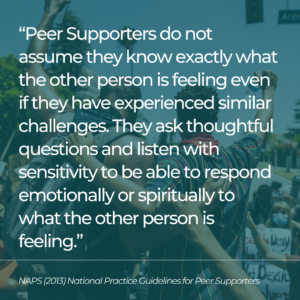Peer Support is an extremely effective and evidence-based mental health service that uses a person’s lived experience to help others in their recovery. This blog is part of our new yearlong series, where each month we will take a deeper look at what it means to work as a Peer Support Specialist and how to adhere to the 12 ethical guidelines created by the National Association of Peer Supporters (NAPS).
For this blog, we will be focusing on the guideline that states Peer Support Specialists are empathetic.
 Why is this guideline important?
Why is this guideline important?
The reasoning behind this guideline may seem obvious, especially since many who seek out “helper” roles already understand the importance of empathy. The ability to understand others is vital in a role that works to help them sort through their mental, and emotional wellbeing. Empathy can help foster connection between a Peer Support Specialist and the person they are working with. For some without a supportive community, this may be in fact the first time they are experiencing empathy.
Empathy between people with similar experiences can also be incredibly powerful. A Peer Support Specialist may be able to relate to a person’s experience on a level that others can’t, simply because they have “been there”. They know what it is like to be in that person’s shoes.
Peer Support would not be as effective without empathy, as it is an incredibly essential part of the process. This doesn’t usually come as a surprise to many, as this tends to be what drew them to the profession in the first place. However, something that isn’t so well known about empathy as a Peer Support Specialist are the boundaries that are necessary in order for it to be successful.
What does this look like in practice?
As previously stated, Peer Support Specialists are sometimes more capable of using empathetic understanding when it comes to the challenges others may face. However, if this understanding results in rushing in to tell a person you’ve had a similar experience or not really listening to how their experience is unique, it can be a problem. It doesn’t create space for someone to share their thoughts, short-circuits your connection with them, and can leave them feeling unheard and disempowered.
While you may be excited to share you have a common experience with someone, don’t let it overshadow the need to focus on their feelings first.
Another common trap that Peer Support Specialists can fall into is empathizing with people too much, to the point of feeling their suffering in a personal way. Compassion fatigue is something nearly all helping professions experience, and Peer Support Specialists can be especially susceptible to it. Those with strong empathetic natures may find themselves taking on other people’s emotional challenges, and often don’t recognize their compassion fatigue until it is too late.
Empathy needs boundaries, and Peer Specialists should find ways to protect themselves from attaching too much to the stressors other people face. Familiarizing yourself with the symptoms of compassion fatigue and knowing when to step back can be a great way to learn where your boundaries lie and how to maintain them.
How to use this guideline moving forward
Empathy is important to keep in mind while working with individuals, but it can be good to remember that it does not always have to be displayed outwardly. Holding space for someone in a way that is understanding can sometimes be just as effective as expressing yourself vocally. Sitting next to someone and just listening to them with empathy can go a long way in making them feel loved and valued. Empathy can be expressed in so many different ways and finding those little ways to show someone you understand can make a huge difference in the work you do together.
